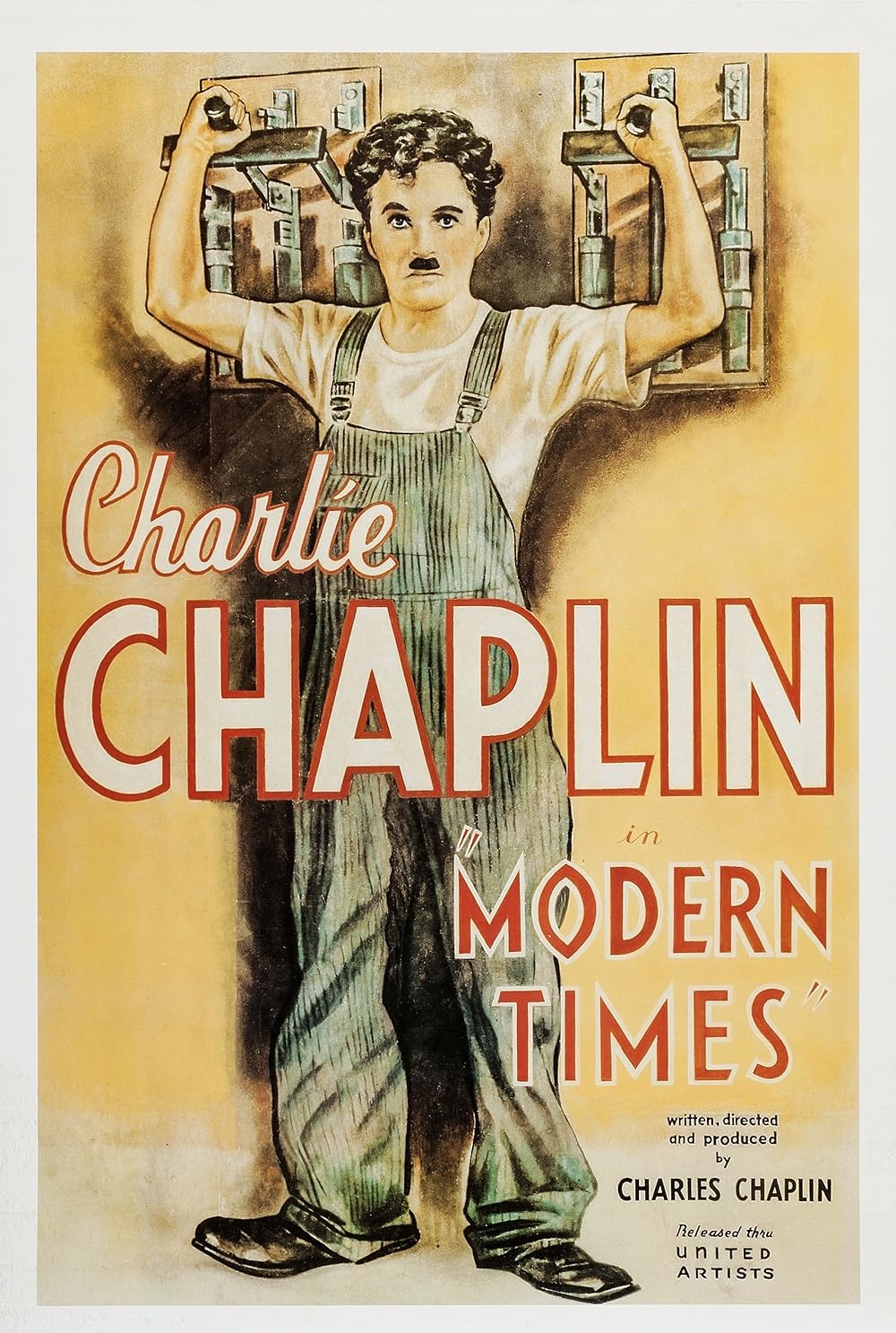Modern Times (1936) – Charlie Chaplin’s Timeless Satire on Industrialization and Humanity
Type: Movie
Country: United States
Genre: Comedy, Drama
Release Date: February 6, 1936
Duration: 87 minutes
Director: Charlie Chaplin
Production Companies: Charlie Chaplin Productions
Cast: Charlie Chaplin, Paulette Goddard, Henry Bergman, Tiny Sandford, Al Ernest Garcia
Quick Review:
“Modern Times” (1936), directed by Charlie Chaplin, stands as a brilliant commentary on the effects of industrialization on the human spirit. This silent film, despite its release during the era of “talkies,” masterfully combines comedy and drama to critique the dehumanizing aspects of modern industry. Chaplin’s performance, combined with his innovative direction and sharp social observations, makes “Modern Times” a timeless classic that continues to resonate with audiences around the world.
Plot Summary:
Set during the Great Depression, “Modern Times” follows the struggles of the Tramp (Charlie Chaplin) as he navigates the harsh realities of industrial life. Working in a factory, he becomes a cog in the machine, performing repetitive and mind-numbing tasks. His attempts to find a better life lead him through a series of misadventures, including a stint in prison and a series of odd jobs.
The Tramp’s encounters with a young woman (Paulette Goddard), who is struggling to provide for her family, introduce a subplot of romance and mutual support. Together, they face a series of challenges and obstacles, striving for a better future despite the overwhelming odds stacked against them.
Characters and Performances:
- Charlie Chaplin (The Tramp): Chaplin delivers one of his most iconic performances as the Tramp, a character known for his resilience and compassion. Chaplin’s physical comedy, combined with his ability to convey deep emotions through subtle gestures, makes the Tramp both endearing and relatable.
- Paulette Goddard (The Gamine): Goddard’s portrayal of the young woman adds a layer of warmth and charm to the film. Her chemistry with Chaplin enhances the romantic and emotional aspects of the story.
- Henry Bergman (The Boss): Bergman’s performance as the factory boss is both comical and menacing, providing a foil to Chaplin’s character and highlighting the oppressive nature of industrial work.
- Tiny Sandford (Big Bill): Sandford’s role as the tough factory worker provides additional comic relief while highlighting the camaraderie among workers.
Direction and Cinematography:
Charlie Chaplin’s direction in “Modern Times” is a testament to his mastery of visual storytelling and his innovative approach to filmmaking. The film’s use of physical comedy and visual gags is both inventive and effective, capturing the absurdities of modern industrial life.
The cinematography, managed by Rollie Totheroh, complements Chaplin’s vision with its clear and expressive imagery. The film’s set design and use of space, particularly within the factory scenes, effectively convey the dehumanizing effects of industrialization.
Music:
The film’s score, composed by Charlie Chaplin, is integral to its emotional impact. Chaplin’s music underscores key moments with a blend of whimsical and poignant themes, enhancing the film’s comedic and dramatic elements. The inclusion of the song “Smile,” which Chaplin wrote for the film, has become an enduring symbol of hope and resilience.
Why It Endures:
“Modern Times” endures as a classic due to its innovative blend of comedy and social commentary. Chaplin’s ability to address serious issues with humor and empathy makes the film relevant across generations. Its critique of industrialization and its impact on the human spirit remains pertinent in discussions about technology and labor.
The film’s universal themes of struggle, resilience, and the quest for a better life continue to resonate with audiences. Chaplin’s performance and direction, along with the film’s innovative use of silent cinema techniques during the era of sound films, contribute to its lasting legacy.
In Conclusion:
“Modern Times” (1936) is a remarkable film that showcases Charlie Chaplin’s genius as a director and performer. With its blend of comedy and social critique, the film provides a poignant and entertaining examination of the effects of industrialization on human dignity. Chaplin’s iconic portrayal of the Tramp and his innovative approach to storytelling ensure that “Modern Times” remains a timeless classic, celebrated for its humor, humanity, and insightful commentary.


